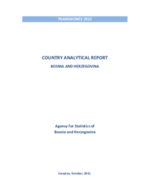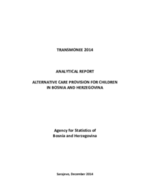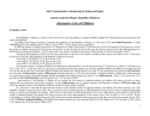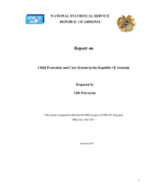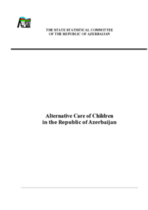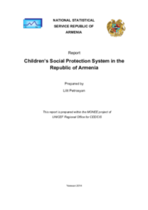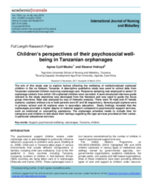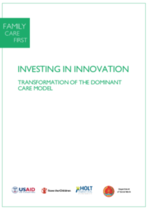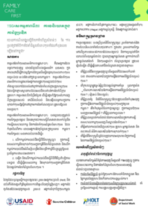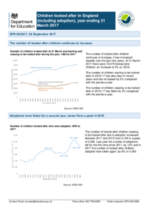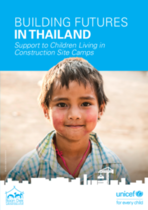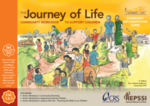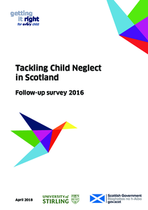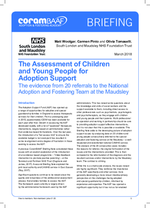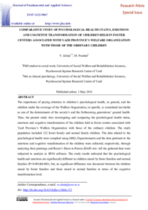Alternative Care Provision for Children in Bosnia And Herzegovina
This document from the Agency for Statistics of Bosnia and Herzegovina provides an overview and assessment of the alternative care system in the country.
Report on Child Protection and Care System in the Republic Of Armenia
This document from the National Statistical Service of the Republic of Armenia provides an overview and assessment of the alternative care system in the country.
Alternative Care of Children in the Republic of Azerbaijan
This report is prepared within the MONEE project of UNICEF Regional Office for CEE/CIS. It provides an overview of alternative care in Azerbaijan.
Children’s Social Protection System in the Republic of Armenia
This report is prepared within the MONEE project of UNICEF Regional Office for CEE/CIS. It provides an overview of alternative care in Armenia.
Japanese residential care quality and perceived competency in institutionalized adolescents: A preliminary assessment of the dimensionality of care provision
The current study uses a culturally and contextually modified early adolescent version of the Home Observation for Measurement of the Environment Inventory (EA-HOME-JP) in Japanese child welfare institutions (CWIs) to provide preliminary data on relevant variables in the caregiving environment that associate with domains of perceived self-competency.
Children’s perspectives of their psychosocial wellbeing in Tanzanian orphanages
The aim of this study was to explore factors affecting the wellbeing of institutionalized orphaned children in Dar es Salaam, Tanzania.
The schooling of orphans and their lives in Malawi : A case study of continued schooling of orphans in secondary education
The purpose of this study was to investigate how orphans in secondary schools, especially those in the low-income class in society, manage to continue their education.
Investing in Innovation - Transformation of the Dominant Care Model: Emerging Practice of Alternative Care for Children in Cambodia Research Findings
This study and documentation of existing reintegration and alternative family care services in Cambodia was designed to build the capacity of existing service providers to take emerging good practice to scale as an increased number of residential care institutions transition.
Emerging Practice of Alternative Care for Children in Cambodia Research Findings - Summary Report
Family Care First (FCF) supported the study and documentation of existing reintegration and alternative family care services provided by seven implementing partners in Cambodia. This brief includes an outline of key findings of the study and concludes with recommendations based on those findings.
Children looked after in England (including adoption), year ending 31 March 2017
This Statistical First Release (SFR) provides information about looked after children in England for the year ending 31 March 2017, including where they are placed, their legal status, the numbers starting and ceasing to be looked after, and the numbers who go missing or are away from their placement without authorisation.
Consequences of parental burnout: Its specific effect on child neglect and violence
This study aims to facilitate further identification of the consequences of parental burnout for the parents themselves, their spouses and their child(ren).
Building Futures for Thailand: Support to Children Living in Construction Site Camps
This report is based on in-depth interviews with migrant children and parents, real estate and construction companies, government Ministries, and NGOs. It explores the challenges faced by children living in construction site camps, and suggests solutions that can be scaled to foster social responsibility within Thailand’s construction sector.
Randomized controlled trial of a parenting program to reduce the risk of child maltreatment in South Africa
This study is the first randomized controlled trial design to rigorously test the effectiveness of a parenting program on reducing the risk of child maltreatment in sub-Saharan Africa using both observational and self-report assessments.
Nurturing Care Framework
The Nurturing Care Framework provides an evidence-based road map for action and outlines how policies and services can support parents, families, other caregivers and communities in providing nurturing care for young children.
"Journey of Life" community workshops to support caregivers and children in need
The series is designed for communities wishing to support children in need and their caregivers. It includes a facilitator training guide and community implementation guide, as well as guides on protecting children from trafficking and abuse.
An Exploration of Complex Longitudinal Relationships Between Care Factors and Post-Care Outcomes in South Africa
This paper serves to illustrate challenges in research on care-leavers and the various ways that research results can be interpreted by drawing on data from a study being conducted in a residential care programme in South Africa.
Changes in out of home care and permanence planning among young children in Scotland, 2003 to 2017
The current study addressed gaps in research on early out of home care and permanency planning through a comparison of two samples of children in Scotland: 110 children born in 2003, and 117 born in 2013, all of whom were placed under compulsory measures of supervision prior to three years of age.
Tackling Child Neglect in Scotland :Follow-up survey 2016
A 2016 survey was commissioned by the Scottish Government to inform the Child Protection Improvement Programme and the Neglect Improvement Pilot. This report presents the findings and analysis from the survey, including achievements and challenges in providing child protection services.
The Assessment of Children and Young People for Adoption Support The evidence from 20 referrals to the National Adoption and Fostering Team at the Maudsley
This Briefing Note adds to the developing picture of adoption support issues by analysing data on 20 children and young people consecutively referred to the special adoption and fostering service at the Maudsley – a wellrespected and established national CAMHS service.
Care and reunification in a Cape Verdean family: Changing articulations of family and legal ties
This article looks at the interaction between transnational family relationships, on the one hand, and family-related immigration policies, on the other.
How Has the Presence of Zimbabwe’s Victim-Friendly Court and Relevant Child Protection Policy and Legal Frameworks Affected the Management of Intrafamilial Child Sexual Abuse in Zimbabwe? The Case of Marondera District
The study intended to assess, based on the perceptions of Victim-Friendly Court (VFC) professionals in Marondera District in Zimbabwe, how the presence of the VFC and relevant child protection policy and legal frameworks has affected the management of Intrafamilial Child Sexual Abuse (ICSA) in Zimbabwe.
Comparative Study of Psychological Health Status, Emotions and Cognitive Transformation of Children Held in Foster Centers Associated with Yazd Province’s Welfare Organization with Those of the Ordinary Children
The present study tries investigating and comparing the psychological health status, emotions and cognitive transformation of the children held in foster centers associated with Yazd Province’s Welfare Organization with those of the ordinary children.
A changing child welfare workforce: What worker characteristics are valued in child welfare?
This study examined data from five cycles over twenty years of Ontario Incidence Studies (-1993, -1998, -2003, -2008, -2013) to provide a profile of child welfare workers.

